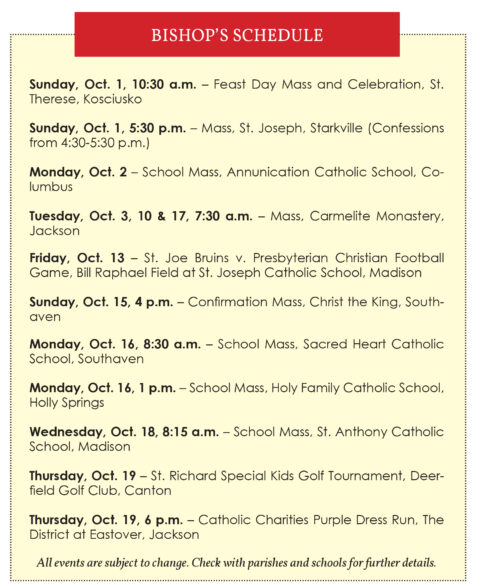By Bishop Joseph R. Kopacz, D.D.
Sunday, Sept. 24 marked the 110th commemoration of the World Day of Migrants and Refugees in our Catholic Church tradition. This commemoration was inaugurated in 1914 by Pope Benedict XV at the peak of immigration from southern and eastern Europe to the United States, Canada and elsewhere. Both sets of my grandparents immigrated from Italy and Poland in 1914-1915 seeking a life of dignity, rooted in faith, family and hard work.
This year Pope Francis has chosen the theme, Free to Migrate – Free to Stay. With this designation the Holy Father is only reminding the nations of the world of Articles 13 and 14 from the 1948 Universal Declaration of Human Rights that state: (13) Everyone has the right to freedom of movement and residence within the borders of each state. Everyone has the right to leave any country, including their own and to return to his country. (14) Everyone has the right to seek and to enjoy in other countries asylum from persecution.

In our time the reality and plight of hundreds of millions of immigrants, migrants and refugees, displaced by natural disasters, war and violence, and unyielding conditions of poverty often strain the spiritual and material resources of many nations. However, there have been admirable responses to the waves of the displaced, for example, with Poland’s welcoming of millions of Ukrainians, Lebanon’s reception of Syrians, and in our own country, the daily processing of 1000s of immigrants, refugees and migrants. All of this is best proclaimed in the spirit of Lady Liberty in New York harbor. “Give me your tired, your poor, your huddled masses yearning to breathe free, the wretched refuse of your teeming shores, send these the homeless tempest-tost to me, I lift my lamp besides the golden door.”
Yet, there are many in every generation of Americans who struggle with the reality of immigration, or who are even hostile toward the waves of migration that have come to our shores and borders. Today, the sheer number of immigrants at our southern border daily strain the resources of the receiving communities and states. The conditions that drive this mass exodus of people from their homelands will not change any time soon and challenge all of us in the United States, especially living on or near the border to respond at the very least, humanely and respectfully.
Recalling St. Paul’s instruction to the Philippians from last Sunday’s second reading, “to live in a manner worthy of the Gospel of Christ” (Philippians 1:27a) the bar is even higher for a more humane and respectful response from those who are the Lord’s disciples.
The Holy Spirit who unveils the heart and mind of Jesus Christ and his Gospel, can illuminate the path to follow the Lord who is the Way, the Truth and the Life. Jesus understood the experience of living in the flesh in everything but sin. (Hebrews 4:15-16) He responded to people’s spiritual and bodily needs with compassion and care.
In the light of the 110th anniversary, on behalf of migrants and refugees; soon after his birth Jesus, Joseph and Mary became refugees in Egypt seeking asylum, running for their lives away from King Herod’s raging paranoia.
Many are on the move today for similar threats to their lives. Throughout his life, Jesus Christ the exile in this world from heaven, had no status in the Roman world and so could be and was crucified. But God’s ways are not our ways, and God’s thoughts are not our thoughts. (Isaiah 55:9) The mystery of God’s plan of salvation reveals that in the resurrection from the dead “you who were once far off have been brought near by the blood of Christ. For he is our peace; in his flesh he has made both groups into one, and has broken down the dividing wall, that is the hostility between us.” (Eph 2:13-14)
Therefore, driven by a love that cannot be walled in, and inspired to a mission that does not let anyone be walled out; the church continues to transcend borders, build bridges and build communities that are a sign of God’s presence among us. Moreover, the conviction of our faith that our citizenship is in heaven can transform our earthly allegiances and guide us from otherness to oneness, and from alienation to communion.

Confessing Jesus as Lord, means that Caesar is not. As Christians follow Jesus as Lord, they challenge the deification of money, the idolatry of the state and the glorification of power. Before God all are one. Here is the bulwark against an ideology of racial superiority, here is the challenge to absolute claims of natural or cultural boundaries, here is the basis for all human dignity, including the dignity of strangers in the land, the right of the migrant to cross borders, whether in fleeing danger or seeking opportunity; the obligation to welcome the stranger and to provide refuge and respect. (The Theology of Migration – Daniel G. Goody) This is the biblical vision which is embraced by the universal declaration of human rights.
In 1914 when Pope Benedict XV inaugurated a World Day for Migrants and Refugees, he understood the apostolic nature of the church; the Body of Christ perpetually in motion, a migrant church, sent into the world on the day of Pentecost with missionary zeal, scattered among the nations by persecutions and martyrdom, perennially and faithfully bearing the Good News of salvation in Jesus Christ until the Lord comes again. Although we are not of the world because we strive to live in a manner worthy of the Gospel of Christ, we are in the world and for the world, for the ultimate good of all.
